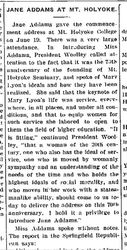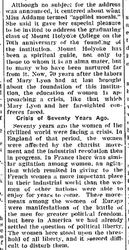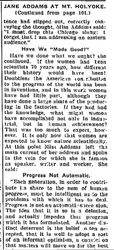JANE ADDAMS AT MT. HOLYOKE.
Jane Addams gave the commencement address at Mt. Holyoke College on June 19. There was a very large attendance. In introducing Miss Addams, President Woolley called attention to the fact that it was the 70th anniversary of the founding of Mt. Holyoke Seminary, and spoke of Mary Lyon's ideals and how they have been realized. She said that the keynote of Mary Lyon's life was service, everywhere, in all places, and under all conditions, and that to equip women for such service she labored to open to them the field of higher education. "It is fitting," continued President Woolley, "that a woman of the 20th century, one who also has the ideal of service, one who is moved by womanly sympathy and an understanding of the needs of the time and who holds the highest ideals of social morality, and who moves in her work with a statesmanlike ability, should come to us today to deliver the address on this 70th anniversary. I hold it a privilege to introduce Jane Addams."
Miss Addams spoke without notes. The report in the Springfield Republican says: [page 2]
Although no subject for the address was announced, it centered about what Miss Addams termed "applied morals." She said it gave her especial pleasure to be invited to address the graduating class of Mount Holyoke College on the 70th anniversary of the founding of the institution. Mount Holyoke has been a spiritual guide, not only to those to whom it is an alma mater, but to many who have been nurtured far from it. Now, 70 years after the labors of Mary Lyon had at last brought about the foundation of this institution, th education of women is approaching a crisis, like that which Mary Lyon and her far-sighted confreres faced.
Crisis of Seventy Years Ago.
Seventy years ago the women of the civilized world were facing a crisis. In England of that period, the women were affected by the chartist movement and the industrial revolution then in progress. In France there was similar agitation among women, an agitation which resulted in giving to the French women a more important place in their industrial world than the women of other nations were able to enjoy for years to come. These movements among the women of Europe were manifestations of the battle of the men for greater political freedom, but here in America we had already settled the question of political liberty. The women here stood upon the threshold of all liberty, and it seemed difficult to disturb them. [page 3]
The Empty Kitchen.
What were American women facing? The industrial revolution was in progress here in New England, and the factories were developing rapidly. Were not the women of that period, who gazed in perplexity at their silent spinning-wheels, like those of today who are confronted by an empty kitchen? Are not the women of that day who left the domestic arts to work in the mill like those of today who prefer to pack breakfast-food into boxes rather than cook oatmeal for a single family? Did the women of the silent spinning wheels perceive that, if women were to adapt themselves to the new life, they must be equipped with a new training? Did they have an underlying thought of the condition they faced? The young women responded to the surge of the period, and went into the factories under the pressure of necessity and blindly, while their mothers were puzzled over it, and their grandmothers were openly troubled.
Must Prepare for Larger Life.
After this consideration of the young woman of the last century who was forced into a new life by the changing of her industrial environment, Miss Addams turned to consider the other type of woman of that period. What of the educated woman in the home, she asked, did she see that she, too, must prepare herself for the larger social life? The culture of the former time, that culture which she had received, was not sufficient for the new situation. She had entered into an inter-class democracy. If she would surmount and live the life of the time, she must have access to the historic past and learn to apply the knowledge of men. This was a stupendous undertaking for the women of that type, -- one they were unable to forecast. For 70 years we have been accomplishing this, and now what have we done? Have we made good, in view of the aims of the work? After this sentence [page 4] had slipped out, correctly conveying the thought, Miss Addams said: "I must drop this Chicago slang; I forget that I am addressing an eastern audience."
Have We "Made Good?"
Have we done what we ought? she continued. If the women had been scientists 70 years ago, how different their history would have been! Doubtless the American contribution to the progress of the world has been in inventions, and in this work women have had little part, although they have done a large share of the producing in the factories. If they had had the knowledge, what might women have accomplished not only in industrial, but in human achievement? That was too much to expect, however. It is only now that women are expected to know nature scientifically. At this point Miss Addams left the main current of her address and spoke in the vein for which she is famous as speaker, writer and worker. She said:
Progress Not Automatic.
"Each generation, in order to contribute its share to the sum of human progress, must be intelligent as to the problems with which it has to deal. Progress is not an automatic succession. The idea that it is so is a delusion, and actually impedes that progress which it has formulated. Another distinct deterrent is the belief often accepted, that it is well to adopt a sort of an informal optimism, a conviction that matters will move on for the best [page 5] independent of all human effort. This theory makes it easy to believe that the industry is all right if its product is salable and its affairs prosperous, no matter how many little children it may be employing; easy to believe that the tenements are all right, and, in fact, to pass over all civil and industrial ills. There are these two types of 'blockades' (if I may use that word) to progress. They are scientific and semi-religious. We fail to study the situation as it actually exists.
Applied Morality Needed.
"If the women do not share in the investigating," continued Miss Addams, connecting her premise with the apparent digression, "and meet the conditions that they find with an applied morality, they will fail, and the end of 70 years of training will find them in a position not unlike that which they faced in the time of Mary Lyon." Our most vexing social problems are outside of the home and the immediate social situation. When we do not try to understand these problems, we whose powers of understanding have been trained, then what remains unsolved is turned over to untrained influences, and the educated woman has lost her chance to be the best moral asset of the time. If our education is of no value to us in meeting the conditions of life of the present day, then we must modify our educational resources for our sisters who are to come. It is here that the American college can be of real service. There are many women who want to do; they are enthusiastic and their ideals are good, but they are naturally emotional, and so they do but little. They become conspicuous and attract attention, but they are like the woman of whom Emerson said, "She calls out, 'I don't know where I'm going, follow me.'" [page 6] They are dangerous guides, and they bring about harmful results.
Push into New Fields.
There appear to be two reasons why the college woman does not take up the work of the period. The college woman is carefully trained, she knows the upward struggles of the race and can appreciate its present problems, but she seems to have exhausted herself in securing her education, to have used up her initiative. Or she is afraid to be unlike other women; she wants to have her house, life and affairs well ordered after the tone of the period. If she would only feel within herself the obligation to push into newer lines! Let us not leave the conventions. But if we are content in merely observing conditions then we have made a negative accomplishment. College women are needed in the newer fields. There is a woman working among the Greeks in Chicago who is able to talk with them fluently. This was made possible for her because of the Greek training that she had received at college, which enabled her to acquire modern Greek with little effort. In your collective student life and your collective development, you have had a chance of training of the right kind. Applied science is not ours, and in it women have taken a minor place, perhaps rightly, but now has come the time when applied morality is in demand. There are thousands of women who have no conception of their obligation to public morals. This responsibility must be viewed with the background, of education. If you know that present methods are young, then you will be encouraged to study the condition. The medieval city was beautiful, but it took no thought of the individual welfare of its citizens; the modern city is in many respects ugly, but it is developing a sense of duty to its people. The sense of historic perspective is necessary in order to form a correct estimate of modern conditions.
Must Not Fear Ridicule.
"Let us see that we are not surprised [page 7] and overtaken in our unpreparedness. Woman must modify her methods of production. The home is more profound than in the way a bed is made and stockings darned. Conditions are ephemeral. It is only as we can apply knowledge to the things about us that we can assume our correct place in the life of our time. It has been estimated that 40,000 women are being graduated from the colleges this June. They will be shirks if they are contented with the success of the moment. If the college girls are afraid of ridicule, if they dread that modern martyrdom, then they will be false to their education, which would tell them when a thing is ridiculous and when it is normal and true. I am sure that this old institution is going to take the next forward step to bring the cultivation of the mind out into some actual accomplishment. You must make a persistent effort. The college-trained woman should be resolved to work on her environment to bring about to a degree that order which she knows has been the ideal of the ages. When men and women get such a wide outlook, we shall begin to realize the natural community, and the strifes of the present period will gradually die away. This time will come when the young are really and truly educated. It is coming faster here in the Connecticut valley than anywhere else in the world. You are trying it here the most of all, and we look to you for the product, the same that Mary Lyon looked for. I can't predict what that product will be, for to predict would be to limit. Don't be afraid because of the lions in your path -- I didn't mean to say that, because there are no lions in your path. I thank you very much for listening so long and so respectfully."























Comments